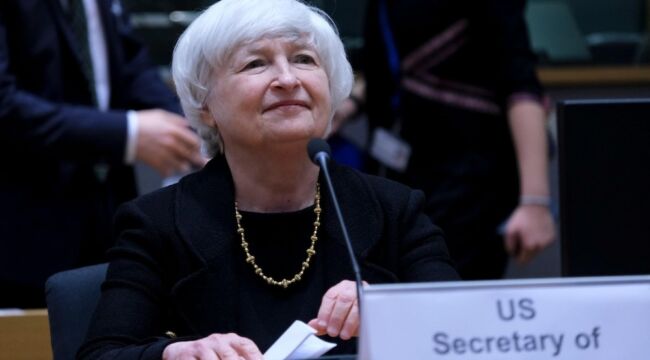Who Watches the Watchmen?
It’s bad enough that Joe Biden is the worst president in US history.
That Antony Blinken is a terrible Secretary of State makes matters worse. Secretary of Defense Lloyd Austin can’t be bothered to clock in nowadays. Attorney General Merrick Garland leaves no impression he’d have been a great SCOTUS justice, seeing his Department of Justice isn’t worthy of its name. And due in no small part to National Security Advisor Jake Sullivan, the world is on fire.
But Janet Yellen? My goodness, Treasury Secretary Janet Yellen takes the cake.
Yellen went to Harvard at a time when Harvard didn’t embarrass itself. She’s got a PhD in Economics. Yellen is married to George Akerloff, a Nobel laureate in Economics. Their son, Robert, is an associate professor of economics at the University of Warwick in England. Yellen was the Chair of the Council of Economic Advisors under Slick Willie Clinton. Heck, she was the Fed Chairman before Jay Powell.
Yellen says Akerlof has been her most significant intellectual influence. Their only disagreement is on free trade. (She’s freer than he is.)
Usually, I’d say, “Aw… What a nice old couple!”
But I find it alarming when it comes to these two.
It’s bad enough that she favors an unenforceable global minimum tax.
And Yellen was plain awful earlier this month when she blurted out, “We don’t have to get the prices down. Wages are going up.” That was at a Senate Banking Committee hearing on the higher prices for many goods purchased by Americans.
But this last one is the icing on the idiot cake.
Janet Yellen wants to steal $300 billion in frozen Russian assets.
Thou Shalt Not Steal
I mean, it’s right there. Commandment Number Seven (if you’re Catholic). It’s Number Eight if you’re Jewish like Janet is.
“Thou shalt not steal.”
Of course, I know you’re a moral person, so I won’t go through any ethics lessons on why stealing is wrong. You know it is. I know it is.
But The State and its parasites often excuse it and themselves from following “normal morality.” That is, if The State does it, it’s okay. (We know things like slavery and mass murder are unacceptable. The State often overlooks such middle class mores.)
But stealing is wrong, even, or especially, when The State does it.
Whether it’s the IRS, eminent domain, or civil asset forfeiture, we can barely contain our righteous rage when The State coerces us.
And that’s just the domestic level.
At the international level, coercion – or, in this case, confiscation – has geometric reverberations.
Who Watches the Watchmen?
The phrase “Who watches the watchmen?” originates from the Roman poet Juvenal, from his Satires. In Latin, the original phrase is Quis custodiet ipsos custodes, which translates to “Who will guard the guards themselves?”
This concept delves into oversight and accountability, questioning who monitors those in positions of power to prevent abuse or corruption.
The significance of this phrase extends beyond its literary origins. It resonates with contemporary issues related to governance, law enforcement, and oversight mechanisms.
In the context of the US government overseeing the US dollar, this question becomes pertinent. It highlights the importance of effective oversight to ensure transparency, prevent misconduct, and maintain trust in financial systems.
If Yellen is successful in stealing Russia’s stuff, trust in the US economic system will be eviscerated.
Oversight of the US Dollar by the US Government
The US government’s oversight of the US dollar involves a complex interplay of economic policies, regulations, and institutions aimed at maintaining stability and trust in the currency. This oversight is crucial for ensuring that the dollar’s value remains stable, inflation is controlled, and economic growth is sustained. The Federal Reserve plays a central role in this oversight by implementing monetary policy decisions that impact the dollar’s value.
Evading Government Oversight
Countries may attempt to evade US government oversight through various means, especially in economic matters related to currencies like the US dollar. The big fear for the US is that some entity like BRICS successfully establish an alternative financial system to circumvent US regulations and monitoring.
If the USD Loses Its Place
If the US dollar loses its reserve currency status, the implications for the US citizenry could be profound and multifaceted. The reserve currency status of the US dollar has historically provided the United States with significant economic advantages, including lower borrowing costs and a strong demand for US financial assets. However, a loss of this status could lead to several adverse outcomes.
Economic Implications
Depreciation of the Dollar: A loss of reserve status likely leads to a significant decline in global demand for the US dollar, causing its value to depreciate. This depreciation would reduce the dollar’s purchasing power, making imports more expensive and leading to inflation within the United States.
Impact on Savings and Investments: The value of savings and investments tied to the dollar would decrease as the currency’s value falls. This includes stocks, bonds, and retirement accounts denominated in US dollars.
Increased Borrowing Costs: The US government and American businesses have benefited from low borrowing costs due to the high demand for US dollar-denominated assets. Losing reserve currency status will increase interest rates, as creditors would demand a higher rate of return for the risk they’re taking, making it more expensive for the government and businesses to borrow money.
Social and Political Implications
Reduced Standard of Living: Inflation, higher borrowing costs, and potential economic disruptions would evaporate the middle and lower classes. The cost of living could increase, while wages wouldn’t keep pace, making it harder for individuals and families to afford necessities.
Increased Economic Inequality: The negative economic impacts of losing reserve currency status could disproportionately affect lower and middle-income households, exacerbating economic inequality. Those with significant assets in physical gold, silver, or other non-dollar-denominated assets would be less affected, creating a wider wealth gap.
Geopolitical Shifts: The loss of the dollar’s reserve status could also lead to shifts in global power dynamics. Other countries or currency blocs could gain influence at the expense of the United States, leading to changes in international relations and trade agreements.
Wrap Up
The question “Who watches the watchmen?” raises fundamental concerns about accountability and oversight, particularly in critical areas like government control over currencies like the US dollar.
Trust is critical; no one will trust a guard who loots the store.
If the USD loses its reserve currency status, the consequences are too great and terrible to imagine.
Oppose Yellen’s idiocy with all your might.



Comments: